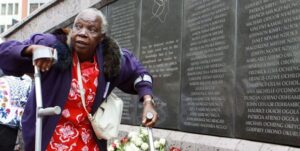 A judge in Washington DC last week awarded six Kenyans injured in the 1998 bombing of the US embassy in Nairobi a total of nearly $1 billion in damages.
A judge in Washington DC last week awarded six Kenyans injured in the 1998 bombing of the US embassy in Nairobi a total of nearly $1 billion in damages.
More than 500 other Kenyan victims who joined the same lawsuit could also be awarded large sums in coming weeks.
US Magistrate Judge John Facciola ruled on September 25 that the six individuals included in a “bellwether trial” conducted in 2011 are each entitled to $150 million in punitive damages.
The judge also decided that each of the plaintiffs is eligible for an additional award ranging from $11.3 to $16.9 million, bringing the total specified sum in the six cases to $985.9 million.
The attack on the embassy, which killed 200 Kenyans and 12 Americans, is “one of the most grotesque and depraved acts imaginable,” Judge Facciola wrote in his 31-page decision.
He added that “it is unclear whether plaintiffs will ever recover their damages in this case.” The awards would come from whatever assets of al-Qaeda that the United States is able to seize. The extent of the terrorist group’s wealth is “unknown,” Judge Facciola noted.
His ruling is the second this year in which victims of US embassy bombings in East Africa have been awarded sizable sums in damages.
Another judge in Washington ruled in April that 23 Tanzanians and Americans killed or injured in the nearly simultaneous August 7, 1998, attack on the US embassy in Dar es Salaam are entitled to a total of $957 million in damages. That judgment was rendered against the governments of Iran and Sudan, which were found to have abetted al-Qaeda’s actions.
Last week’s ruling marks a victory for US attorney Philip Musolino as well as the Kenyan victims. Mr Musolino has pursued the case for 15 years.
A bellwether trial of the sort that took place in Judge Facciola’s court three years ago involves a random sample of cases drawn from a large group of plaintiffs. A jury’s verdict in a bellwether trial serves as the basis for resolving the remaining cases, which in this instance total 515.
Judge Facciola scheduled an October 3 conference on the cases still to be decided.
The six Kenyans awarded damages last week are Castro Otiende, Protus Manyasa Buluma, Dipak L. Shah, Wilfred Nderitu, Charles Makori Mogi, and Kioko Muema.
Judge Facciola dismissed the cases of two other Kenyans named as plaintiffs in the bellwether trial — Abel Mutego Nijru and Felistus Njeri Thuo—because they had died in the attack and “as deceased individuals, lack the capacity to sue.”
Mr Otiende, a 44-year-old married man with four daughters, suffered permanent scarring from flying glass that cut his neck and chest. In addition to having “sharp pain in his ears when he hears a slight noise,” Mr Otiende “believes that some people in Kenya regard him as being unlucky or being bad luck because he was a victim of the embassy bombing,” Judge Facciola wrote.
Mr Buluma, 51, is married and has five children. The real estate valuation and property management office where he worked in 1998 was directly across the street from the US embassy. The bombing left Mr Buluma with “very little vision in his left eye and 20 per cent vision in his right eye,” the judge noted. He also quoted Mr Buluma as saying of other bomb victims he saw: “Some of them were in very bad shape, very bad. Some people had their whole face burned, and you could see meat, nothing else.”
The “Cloud Nine” menswear shop that Mr Shah co-owned was destroyed in the attack. In addition to losing 20 kilos in weight in the past 12 years, Mr Shah “cannot manage tasks he was able to do before the bombing, such as using a keyboard and texting,” Judge Facciola wrote.
Mr Nderitu, an attorney, had offices on the seventh floor of the NHC House overlooking the embassy. As a result of the blast, Mr Nderitu “suffered loss of memory, loss of the ability to retain information and loss of the ability to concentrate,” according to the ruling.
As the owner of a successful stationery supply business near the embassy, Mr Mogi employed two workers and was able to build a home. He must now expend Ksh4000 per month for medication for high blood pressure attributable to the effects of the bombing.
Mr Muema was a passenger on a public minibus that had stopped at a traffic light at a nearby intersection when the bomb exploded at 10:30am on August 7, 1998. One year later, Mr Mueuma’s left eye was removed in surgery.
In deciding awards on the basis of pain and suffering, Judge Facciola relied on a report written by Joan Mwendi Kiema-Ngunnzi, a sociologist who conducted research on the effects of the bombing on employees of the Kenya’s Teachers Service Commission, whose offices were destroyed in the attack.
Ms Kiema-Ngunnzi concluded that survivors of the bombing suffered post-traumatic stress disorder. They also were marked with a social stigma that they continue to experience, she found. Those affected by the attack “are referred to, in a demeaning sense, as ‘bomb people,’ Judge Facciola wrote in his summary of Ms Kiema-Ngunnzi’s report.
- ntvuganda.co.ug









